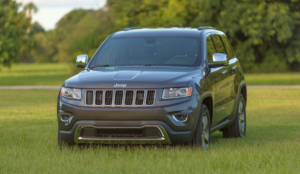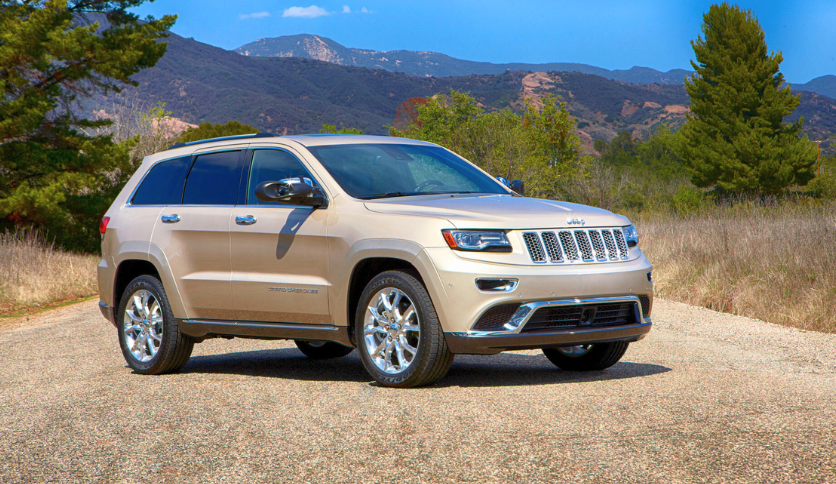When owning a Jeep Grand Cherokee, you’re embracing a world of adventure and reliability. However, even the most robust vehicles have quirks, and the Grand Cherokee is no exception, especially regarding electrical issues. Electrical problems in a Jeep Grand Cherokee can range from minor annoyances to major concerns, impacting everything from the dashboard lights to the engine’s performance.
This article will delve into the common electrical problems that Jeep Grand Cherokee owners might encounter, helping you understand, diagnose, and address these issues effectively. Whether you’re a long-time Jeep owner or new to the brand, this guide is designed to equip you with the knowledge you need to keep your Grand Cherokee running smoothly.
What are Common Electrical Issues in Jeep Grand Cherokees?
Jeep Grand Cherokee owners often encounter problems with dashboard warning lights, battery issues, and wiring complications.
Navigating Through Jeep Grand Cherokee Dashboard Warning Lights
The dashboard of a Jeep Grand Cherokee is like the vehicle’s communication hub. It uses various warning lights to alert drivers about potential issues. These lights can indicate anything from engine problems (signaled by the check engine light) to electrical malfunctions (such as the battery light). Understanding what each light means is crucial for timely and effective intervention. For instance, a blinking check engine light might suggest a severe problem needing immediate attention. Regularly monitoring these signs and prompt responses can prevent small issues from escalating.
Jeep Grand Cherokee Battery Problems and Solutions
Battery problems are among the most common electrical issues in Jeep Grand Cherokees. Symptoms include the vehicle not starting, electrical components functioning erratically, or the battery warning light illuminating on the dashboard. Common causes include old age, faulty alternator not charging the battery properly, or parasitic drains (where certain components continue to draw power even when the vehicle is off). Regular maintenance like checking for corrosion on battery terminals, ensuring the battery is properly secured, and getting the battery tested periodically, can prevent these issues. However, if the battery frequently drains or fails to charge, it’s advisable to consult a professional mechanic.
Why Do Jeep Grand Cherokees Experience Electrical Problems?

Electrical issues in Jeep Grand Cherokees stem from aging components, alternator faults, and software glitches.
Exploring the Causes Behind Electrical Failures in Jeep Grand Cherokees
Jeep Grand Cherokees are tough and reliable, but like any vehicle, they’re not immune to electrical issues as they age. Understanding the common reasons behind these problems can help you spot and fix them before they turn into bigger headaches.
One of the main culprits for electrical woes in Jeep Grand Cherokees is aging wiring. Over time, the wires that run through your car can get old and brittle. This isn’t just about age – things like heat, moisture, and the wear and tear of driving can all take a toll. When these wires break down, they can short-circuit. This means they might accidentally connect or disconnect, causing your car’s electrical system to act up. It can be anything from lights flickering to the car not starting at all.
Then there’s the alternator. This part is like your car’s powerhouse, charging the battery and keeping everything running while you drive. If the alternator isn’t working right, it can’t charge the battery properly. You might notice that your car’s lights seem dimmer than usual, or your battery dies more quickly than it should. Sometimes the issue might be with the alternator belt – if it’s loose or worn out, the alternator can’t do its job.
Lastly, we can’t ignore software glitches. Today’s cars are pretty high-tech, and the Jeep Grand Cherokee is no exception. It relies on computer systems to control everything from engine timing to the radio. But sometimes, these systems’ software can glitch, just like your smartphone or computer might. These glitches can cause all sorts of odd problems, like your dashboard lights going haywire or the car not responding the way it should.
By keeping an eye on these areas – the wiring, alternator, and software – you can catch many electrical problems early. Regular check-ups and maintenance can go a long way in preventing these issues from turning your Jeep adventure into a roadside headache. Remember, when in doubt, it’s always a good idea to consult with a professional who knows the ins and outs of your Grand Cherokee’s electrical system.
How to Diagnose and Fix Electrical Problems in Your Jeep Grand Cherokee
Diagnosing electrical issues in a Jeep Grand Cherokee usually involves checking the battery, inspecting the wiring, and using diagnostic tools. For more complex problems, it’s often best to seek professional help.
DIY Tips for Troubleshooting Jeep Grand Cherokee Electrical Issues
Tackling electrical problems in your Jeep Grand Cherokee can seem daunting, but with a bit of know-how and the right approach, many issues can be diagnosed and sometimes even fixed at home. Here’s a simple guide to help you get started:
- Check the Battery: The first step is to look at the battery because it’s the power source for all the electrical components in your car. Make sure it’s fully charged. A car battery tester or a multimeter can be used to check the battery’s voltage. A healthy battery should typically show around 12.6 volts when the car is off and about 13.7 to 14.7 volts when the engine is running.
- Inspect the Wiring: Next, take a look at the visible wiring. You’re checking for any signs of wear and tear, like frayed wires, or loose connections that could be causing problems. Pay special attention to areas where wiring bends or goes through tight spaces, as these are common places for damage.
- Use a Multimeter: A multimeter is a handy tool that can help you diagnose a variety of electrical issues. You can use it to check for continuity (to make sure electricity is flowing where it should be) and to identify any short circuits or open circuits.
- Read Error Codes with OBD Tools: For more advanced troubleshooting, you might need an OBD (On-Board Diagnostics) scanner. These tools plug into your car’s OBD port and can read diagnostic trouble codes (DTCs) from the car’s computer system. These codes can give you a good idea of what might be going wrong.
Professional Repair Solutions for Jeep Grand Cherokee Electrical Problems
While many electrical issues can be diagnosed and sometimes fixed at home, there are cases where you’ll need to call in the professionals. Here’s when and why:
- Complex Electrical Problems: If you’re dealing with intricate issues like problems with the vehicle’s onboard computer system, advanced diagnostic equipment and expertise are required.
- Specialized Tools and Knowledge: Professional mechanics have access to specialized tools and have in-depth knowledge that allows them to diagnose and fix electrical problems accurately. They can handle tasks that are too complex for most DIY solutions, like rewiring or updating the car’s computer software.
- Safety and Assurance: Working with electrical systems can be risky. Professionals ensure that all repairs are done safely and effectively, giving you peace of mind.
While some electrical issues in your Jeep Grand Cherokee can be tackled with DIY methods, it’s important to know when to seek professional help. Regular maintenance and early detection of problems are key to keeping your vehicle in top condition. Remember, safety should always be your priority when dealing with car repairs.
The Importance of Regular Maintenance to Prevent Electrical Issues in Jeep Grand Cherokees

Owning a Jeep Grand Cherokee is a lot like taking care of a sturdy yet sophisticated piece of machinery. Regular maintenance is crucial to ensure it runs smoothly and avoids electrical hiccups. Just like we go for regular health check-ups, your Jeep needs consistent care to prevent electrical issues. Let’s break down what this involves.
Regular Battery Checks
The battery is the heart of your Jeep’s electrical system. Think of it like the battery in your phone; it needs to be healthy to keep everything running. Regularly checking your Jeep’s battery involves looking at a few things. First, is it fully charged? A weak or dying battery can lead to all sorts of electrical gremlins. Second, are the connections clean and tight? Corroded or loose terminals can cause poor electrical flow. And finally, how old is the battery? They don’t last forever, and an aging battery could be the root of electrical troubles.
Wiring Inspections
Your Jeep’s wiring is like the nervous system, sending electrical signals all over the vehicle. Over time, wires can wear out, get loose, or even break. Doing a regular visual check for any obvious damage or wear can save you from bigger problems later. If a wire looks frayed or the insulation is cracked, it’s a sign that it needs attention.
Checking the Alternator
The alternator is what keeps your battery charged while you drive. If it’s not working right, your battery won’t charge properly, leading to a whole cascade of electrical issues. Regular checks include listening for any unusual noises, checking for warning lights on your dashboard, and ensuring the alternator belt is in good condition.
Adhering to the Manufacturer’s Maintenance Schedule
Jeep knows best about how often your Grand Cherokee needs a check-up. Following the maintenance schedule laid out in your owner’s manual is like following a doctor’s advice. It covers everything from basic checks to more in-depth inspections and is tailored to keep your specific model running its best.
By taking these proactive steps, you’re not just maintaining your Jeep; you’re ensuring it remains a reliable companion on all your adventures. Regular maintenance can seem like a chore, but it’s the secret to a long-lasting, trouble-free relationship with your Jeep Grand Cherokee. Remember, taking care of small issues now can prevent them from becoming big, costly problems.
Advanced Electrical Problems in Jeep Grand Cherokees and Their Solutions
When it comes to advanced electrical issues in Jeep Grand Cherokees, things can get a bit tricky. Problems like failures in the PCM (Powertrain Control Module) or ECM (Engine Control Module) are complex and critical for your vehicle’s proper functioning. Let’s dive deeper into understanding these issues and how best to address them.
Navigating Complex Electrical System Failures in Jeep Grand Cherokees
Advanced electrical problems in your Jeep Grand Cherokee, particularly those related to the PCM or ECM, are best resolved through professional diagnosis and repair.
- Understanding PCM/ECM and Their Importance: The PCM and ECM are the brains of your Jeep Grand Cherokee. They control and manage the engine and other vital functions. Think of them as the computers that keep everything running smoothly. When these systems fail, they can cause a variety of issues, such as engine misfires, poor fuel efficiency, or even prevent the car from starting.
- Identifying the Signs of PCM/ECM Failure: Some common indicators that your PCM or ECM might be failing include the check engine light coming on, the car unexpectedly stalling or not starting, and performance issues like reduced fuel efficiency or power loss. Sometimes, your vehicle might even display unusual behavior like sudden jerking or shaking.
- Why These Failures Occur: PCM or ECM failures can be due to various reasons such as electrical shorts, overheating, moisture, or simply the age and wear of the vehicle. In some cases, issues like a faulty battery or alternator, which cause voltage fluctuations, can also lead to PCM/ECM damage.
- The Role of Professional Diagnosis: Diagnosing a PCM or ECM issue requires expertise and specialized equipment. Mechanics use advanced diagnostic tools to read error codes from your Jeep’s computer system. These codes provide insights into what’s going wrong, helping to pinpoint the exact issue.
- Repairing PCM/ECM Issues: Repairing or replacing a PCM or ECM is not typically a DIY job. It often involves reprogramming and needs to be precisely matched to your vehicle’s specifications. A professional mechanic can ensure that the new system is properly installed, configured, and tested.
- Preventive Measures: While PCM/ECM failures can be hard to predict, regular vehicle maintenance can help minimize the risk. Keeping your vehicle’s electrical system in good shape, ensuring the battery and alternator are functioning correctly, and avoiding situations where your Jeep is exposed to extreme moisture or heat can prolong the life of these components.
Advanced electrical problems like PCM/ECM failures in a Jeep Grand Cherokee can be daunting; understanding their significance and seeking professional help for diagnosis and repair is the best course of action. Regular maintenance and being attentive to your vehicle’s performance can also help catch issues early, preventing bigger problems down the road.
FAQs about electrical problems with Jeep Grand Cherokee
What are the first signs of electrical problems in a Jeep Grand Cherokee?
The first signs can include flickering dashboard lights, starting issues, and unusual battery drain.
Can I fix electrical issues in my Jeep Grand Cherokee at home?
Minor issues can often be fixed at home, but professionals should handle complex problems.
How often should I have my Jeep Grand Cherokee’s electrical system checked?
It’s recommended to have a professional check at least once a year or as per the manufacturer’s guidelines.
What are the estimated costs of repairing electrical problems in a Jeep Grand Cherokee?
Costs can vary widely based on the issue, ranging from a few dollars for simple fixes to hundreds or more for major repairs.
Conclusion
Dealing with electrical problems in your Jeep Grand Cherokee can be a bit of a journey. From dashboard warnings to more complex issues like PCM/ECM failures, these electrical quirks require attention and care. But don’t let this discourage you. Understanding these problems is the first step in keeping your Grand Cherokee in top shape. Whether through regular maintenance to prevent issues or seeking professional help for more complex troubles, you can ensure your Jeep stays reliable and ready for any adventure. Remember, every vehicle has challenges, but you can confidently navigate them with the proper knowledge and approach. Keep this guide in mind; you’ll be well-equipped to tackle any electrical issues your Jeep Grand Cherokee might throw.

Hello there, this is Thomas Byrd. I am a professional car mechanic who leads a team of junior mechanics in a repair and restoration shop. In the beginning, I used to work for a jeep service center as a basic worker. From there I keep learning, changed my job 2 times and now I am a professional who leads a group of mechanics. Though a have expertise in the jeep, I know very well about all types of cars. To share my knowledge and skills with others I have created this blog website. Whenever I get free time from work I give my time to my blog.

